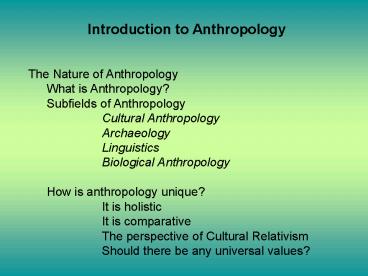Introduction to Anthropology - PowerPoint PPT Presentation
1 / 37
Title: Introduction to Anthropology
1
Introduction to Anthropology
The Nature of Anthropology What is
Anthropology? Subfields of Anthropology Cultural
Anthropology Archaeology Linguistics Biological
Anthropology How is anthropology unique? It is
holistic It is comparative The perspective of
Cultural Relativism Should there be any
universal values?
2
Etymology of Anthropology
Greek term anthropos meaning Man and logia
or logis, meaning science Literally the
study of Man (human species)
3
Anthropology is the study of humans, both
ancient and modern
4
Forms of Cultural and Biological Adaptation to
High Altitudes
5
Subfields of Anthropology
Anthropology
Biological Anthropology
Archaeology
Cultural Anthropology
Linguistic Anthropology
Ethnographic Studies Ethnological Studies
including focus areas in Economics
Politics Gender Religion Play
Art Music Kinship Social
organization Healing arts Urban
studies Applied
Paleoanthropology Primatology Contemporary
Human Variation Applied
Prehistoric Archaeology Historical
Archaeology Cultural resource
management Ethnoarchaeology Experimental Applied
Historical Descriptive Sociolinguistics Ethnolingu
istics Applied
6
Biological Anthropology
Paleoanthropology
7
Louis Leakey displaying cast of fossil hominid
Skull from East Africa
8
Biological Anthropology
Primatology
9
(No Transcript)
10
(No Transcript)
11
Biological Anthropology Contemporary Human
Variation Genetics
12
Archaeology Prehistoric Archaeology
13
(No Transcript)
14
(No Transcript)
15
Archaeology Historical Archaeology
Plymouth Plantation Summer 1970
16
Archaeology Cultural Resource Management
17
Archaeology Ethnoarchaeology
18
(No Transcript)
19
Archaeology Experimental
20
Cultural Anthropology Ethnographic Studies
21
Cultural Anthropology Ethnological
Studies Politics
22
Cultural Anthropology Ethnological Studies Gender
23
Cultural Anthropology Ethnological
Studies Religion
24
Cultural Anthropology Ethnological Studies Art
and Music
Ankor wat
Angola Ivory figurine
Angola Art
25
Cultural Anthropology Ethnological Studies Kinship
26
Cultural Anthropology Ethnological Studies Social
Organization
27
Cultural Anthropology Applied
28
Students Select another of your introductory
level college courses and list three specific
ways that the subject matter of anthropology is
different from these disciplines and one way it
is the same. Compare and discuss your list with
that of a classmate
29
How is Anthropology Unique?
- Anthropology is Holistic
- Anthropologists Do Fieldwork
- Anthropologists Focus on the Comparative Method
- The Perspective of Cultural Relativism
- Cultural Ethnocentrism
- Should There Be Any Universal Values?
30
Anthropology is Holistic
- Holistic sees human behaviors as a complex set
of interacting behaviors and ideas. - Biological
- Perspective
- Cultural Perspective
- Broad Time Frame
31
Example in Holism The Fore of New Guinea
- A group of about 14,000 horticulturalists living
in New Guinea - First contacted in the 1950s by the Australian
government with a significant number of
individuals found suffering from a particular
illness. - Symptoms include jerking and shaking movements
which make planned motor activity difficult. - Fore call it the kuru to tremble with fear
- A medical team was sent to deal with the problem
and find a solution. - it was an infectious agent passed from one person
to the next. - Was it contaminated water? Airborne? Sexual
activity? - The answer was solved by an anthropologists
cannibalism!
32
Fore Custom of Cannibalism
- It is customary of the Fore to eat the body as
part of the funeral rituals. - The body of the deceased was carried down to an
abandoned field, where kin dismembered and cooked
it. - Close relatives then consumed the pieces.
- Cooking, therefore, does not destroy the
parasite. - They would enter the bloodstream via cuts on the
individuals. - Because women and children had lower social
status, they were more likely to get the last
portionsthe brainwhere the parasite usually is.
33
How the Fore illustrates holism
- First, we begin with a medical problem, a disease
- Then we see how this fatal disease affects
various aspects of the society because of the
death of women of childbearing age. - This includes marriage, the family, the raising
of children, farming, and so forth. - Also, we see that Fore society attempt to explain
and deal with the disease through religion. - A description of the kuru among the Fore as ONLY
a medical problem fails to provide us with a
complete understanding of that disease.
34
Anthropologists Do Fieldwork
- Cultural Anthropology in the Field
- Archaeology in the Field
- Linguistics in the Field
- Biological Anthropology in the Field
35
Anthropologists Focus on the Comparative Method
- The Comparative Method is Used in all Fields of
Anthropology
36
Cultural Ethnocentrism Makes value judgments when
describing aspects of another culture The
tendency to view ones own culture as best and to
judge the behavior and beliefs of culturally
different people by ones own standard The
Concept of Cultural Relativism The position that
the values and standards of cultures differ and
deserve respect. Aspects of a culture must be
viewed and evaluated from within the context of
that culture.
37
These four approaches, when used in concert with
one another, give anthropology its unique
perspective































